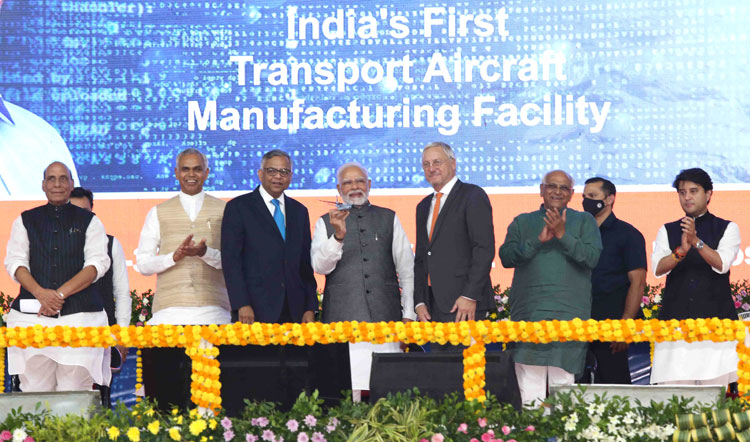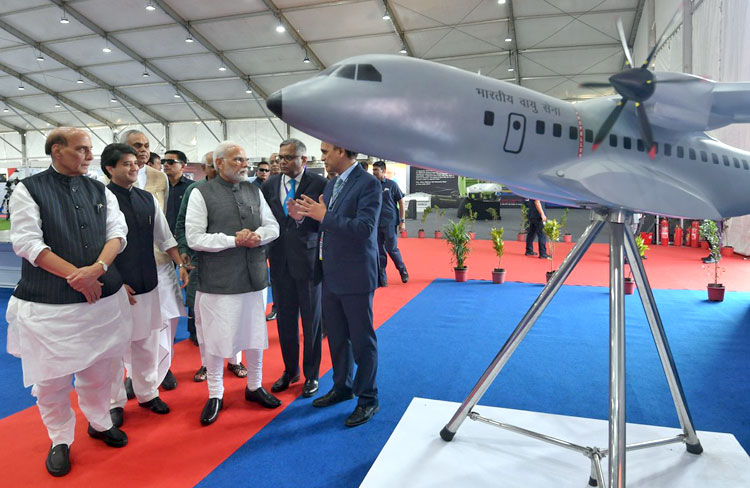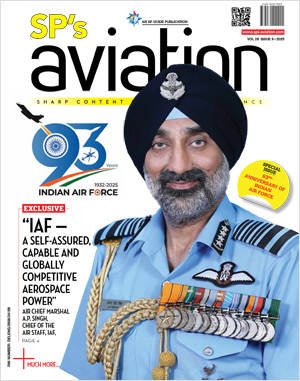INDIAN ARMED FORCES CHIEFS ON OUR RELENTLESS AND FOCUSED PUBLISHING EFFORTS

The insightful articles, inspiring narrations and analytical perspectives presented by the Editorial Team, establish an alluring connect with the reader. My compliments and best wishes to SP Guide Publications.

"Over the past 60 years, the growth of SP Guide Publications has mirrored the rising stature of Indian Navy. Its well-researched and informative magazines on Defence and Aerospace sector have served to shape an educated opinion of our military personnel, policy makers and the public alike. I wish SP's Publication team continued success, fair winds and following seas in all future endeavour!"

Since, its inception in 1964, SP Guide Publications has consistently demonstrated commitment to high-quality journalism in the aerospace and defence sectors, earning a well-deserved reputation as Asia's largest media house in this domain. I wish SP Guide Publications continued success in its pursuit of excellence.
- A leap in Indian aviation: Prime Minister Modi inaugurates Safran's Global MRO Hub in Hyderabad, Calls It a Milestone
- All about HAMMER Smart Precision Guided Weapon in India — “BEL-Safran Collaboration”
- India, Germany deepen defence ties as High Defence Committee charts ambitious plan
- True strategic autonomy will come only when our code is as indigenous as our hardware: Rajnath Singh
- EXCLUSIVE: Manish Kumar Jha speaks with Air Marshal Ashutosh Dixit, Chief of Integrated Defence Staff (CISC) at Headquarters, Integrated Defence Staff (IDS)
- Experts Speak: G20 Summit: A Sign of Global Fracture
Make in India C295 Military Aircraft
India had sealed the deal with Airbus to procure 56 x C295 transport aircraft for the IAF under a project that entails manufacturing of military transport aircraft in India for the first time by a private company
 |
The Author is Former Director General of Information Systems and A Special Forces Veteran, Indian Army |

October 30, 2022 was a historic day in the history of India's Aerospace Industry when Prime Minister Narendra Modi laid the foundation stone for the manufacturing plant of C295 transport aircraft in Vadodara in Gujarat. This facility will also be manufacturing additional aircraft as per requirements of the IAF and also for exports in the future. This is the very first project of its kind in which a military aircraft will be manufactured in India under transfer of technology (ToT) by the private sector.
Laying the foundation stone, Prime Minister Modi described it as India's giant leap towards becoming self-reliant in the aviation sector. He said, "India is making its own fighter plane, tank, submarine and medicines, vaccines, electronic gadgets, mobile phones, and its cars are popular all over the world. Now, India will become a manufacturer of transport planes and soon also make passenger planes, tagged 'Make in India'. Transport aircraft will give more power to the country's defence forces, even as India will create its identity as a global aviation hub. Over 100 MSME suppliers will be associated with this project, which will help in realising the vision of 'Make in India, Make for the globe'."
Airbus will deliver the first 16 aircraft in 'fly-away' condition from its assembly line in Seville, Spain within four years and the subsequent 40 aircraft will be manufactured and assembled by TASL in India within 10 years of the contract
In September 2021, India had sealed the 22,000 crore deal with Airbus Defence and Space to procure 56 x C295 transport aircraft to replace the ageing Avro-748 aircraft of the IAF under a project that entails manufacturing of military aircraft in India for the first time by a private company. The regulatory approval for the ambitious programme was accorded by Directorate General of Aeronautical Quality Assurance (DGAQA).
European aviation major Airbus had earlier said that it has received the regulatory approval from the Indian regulator for its C295 aircraft programme, becoming the first foreign original equipment maker to get such a nod, saying, "Apart from making 40 aircraft, this facility at Vadodara in Gujarat would be manufacturing additional aircraft for Air Force requirements and exports." The certificate of approval was handed over by Director General of DGAQA Sanjay Chawla to Kajetan von Mentzingen, Head of Quality of Airbus Defence and Space at a ceremony held on the sidelines of DefExpo 2022 in Gandhinagar, Gujarat.

Mentzingen marked it a significant first step of a comprehensive quality assurance roadmap agreed between Airbus and DGAQA for the C295 'Make in India' programme and said, "We have crossed a milestone for the C295 'Make in India' programme. This certification demonstrates the trust and confidence that DGAQA places in Airbus quality standards. It marks the beginning of a robust and comprehensive roadmap that Airbus has put in place for the C295 'Make in India' programme. It will be the foundation for successful aircraft manufacturing in India under the policy of Aatmanirbhar Bharat."
After the deal was finalised last year, Airbus said the C295 programme will see the company bring its complete bouquet of world-class aircraft manufacturing and servicing to India in collaboration with its industrial partners, including the Tatas and leading defence public sector units such as Bharat Electronics Ltd and Bharat Dynamics Ltd.
With its 5-10 tonne capacity, the C295 is known to be a superior aircraft used for tactical transport of up to 71 troops or 50 paratroopers, and for logistic operations to locations that are not accessible to current heavier aircraft
According to Sukaran Singh, Managing Director and Chief Executive Officer of Tata Advanced Systems Limited (TASL), "For the first time, an Indian company will be wholly manufacturing an aircraft in India. TASL, in partnership with Airbus, will literally take raw aluminum ingots on one end and convert it into a flyaway aircraft on the other end. It's certainly a matter of great privilege to be able to say that Tata's have now extended themselves from salt and software to cars and making planes now."
Of the 56 x C295 aircraft under the deal, Airbus will deliver the first 16 aircraft in 'fly-away' condition from its final assembly line in Seville, Spain within four years and the subsequent 40 aircraft will be manufactured and assembled by TASL in India within 10 years of the contract as part of an industrial partnership between the two companies. According to Sukaran Singh, it has been 11 years since the Tata Group decided to partner with Airbus for the programme and this was one of the last projects that Ratan Tata, former Chairman of Tata Sons, helped put together during the end of his tenure.

Remi Maillard, President of Airbus India and Managing Director of South Asia has said that the first aircraft would be delivered to the IAF in two years and the delivery of 16 aircraft in flyaway condition completed in four years. According to Jean-Brise Dumont, Executive Vice President Military Aircraft of Airbus, "Eventually, the C295 will be made in India with creation of 15,000 direct jobs and 10,000 indirect jobs over the coming 10 years and that is absolutely significant."
With its 5-10 ton capacity, the C295 is known to be a superior aircraft used for tactical transport of up to 71 troops or 50 paratroopers, and for logistic operations to locations that are not accessible to current heavier aircraft. The aircraft can airdrop paratroops and loads, and also be used for casualty or medical evacuation. The aircraft is capable of performing special missions as well as disaster response and maritime patrol duties. The Ministry of Defence (MoD) has said, "The aircraft (C295) will give a major boost to the tactical airlift capability of the IAF, especially in the northern and northeastern sectors and the Andaman and Nicobar Islands".
The aircraft (C295) will give a major boost to the tactical airlift capability of the IAF, especially in the northern and northeastern sectors and the Andaman and Nicobar Islands
The above indeed is a landmark achievement in the private sector to manufacture military aircraft. India needs to use it as the stepping stone for private firms or conglomerates to commence producing fighter jets and military helicopters, as being done in the US, the UK, France and other European countries. This should be an absolute priority to meet the requirement of our national security, which in turn will also exponentially boost defence exports – in line with the concept of 'Make in India, Make for the World'.
The Army is still operating 190 obsolete Cheetah and Chetak helicopters; five of them over 50 years old and bulk of the fleet (130 of the 190) between 30 to 50 years old. The Navy and the Air Force also operate these obsolete helicopters. The IAF has around 120 Cheetah and Chetak helicopters. The Indian Navy's Aviation Squadron 'INAS 561' also operates Chetak helicopters. Similarly, the MiG-21 squadrons of the IAF are also to be replaced by the indigenous Tejas. While the IAF is looking for at least 220 Tejas fighters in various configurations, the Tejas Mk2 is likely to get airborne only in 2026 and the first operationally capable Tejas Mk2 is likely to be available not before 2036.
Clearly, the Hindustan Aeronautical Limited (HAL) cannot replace these obsolete fixed and rotary aircraft in a "suitable time frame". The private sector needs to be incorporated in a major way, as has been done for manufacturingthe C295 military aircraft under 'Make in India'.





